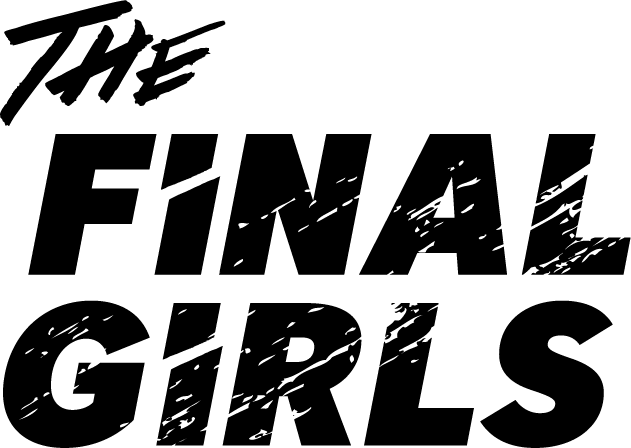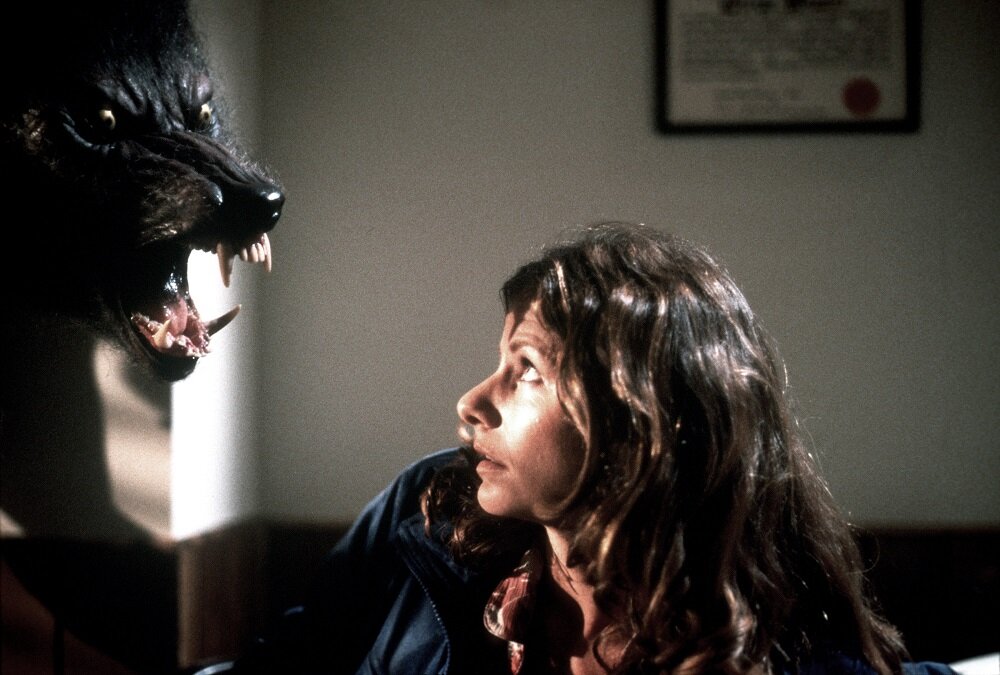The Howling at 40: Werewolves, Trauma and Toxic Masculinity
By Sara Century
1981 saw the release of three prominent werewolf movies; An American Werewolf in London, Wolfen, and of course, The Howling. Each of them explored werewolf mythos in a contemporary context with surprisingly different results, and all would go on to become horror staples, but The Howling stands out as being unique to the werewolf genre, even by today’s standards. Focusing on a newscaster and her well-meaning husband as they encounter a gang of rural werewolves, The Howling is both a fun (and often silly) movie as well as one that offers salient commentary on how werewolf tropes play directly into themes of toxic masculinity and gaslighting.
Karen White is a successful TV anchor living in LA with her husband, Bill. Her job is stressful but she maintains a calm, docile demeanor as she goes through the motions. Through the bright lights and fast pace of a TV studio, we learn from Karen’s co-workers, rather than Karen herself, that a misogynistic serial murderer named Eddie has spent weeks harassing her through constant phone calls and letters. The police decide to use Karen as bait to catch Eddie, and she agrees with little fuss, putting her complete faith in a system that quickly fails her. She meets Eddie in a grimy theater and he forces her to watch a woman being tortured on the screen before she blacks out in horror. The police arrive too late to prevent Karen from experiencing this trauma and although they shoot Eddie, he ultimately survives (werewolf) and tears his way out of a mortuary to continue his hunt.
As Karen struggles to recover from what happened, she takes time away from work. Her therapist, Doctor Waggner, advises that she and Bill go to an isolated “health resort” that he calls The Colony. There they encounter a bizarre menagerie of locals and a brand new mystery when mutilated livestock appear near the cabin where they’re staying. Creepy siblings Marsha and T.C. Quist take an interest in Karen and Bill, and we later discover that Eddie is their brother. Marsha attempts to seduce Bill initially infuriate him but as he becomes more and more impatient and annoyed with Karen’s PTSD, he ultimately follows her into the woods. Scratched by a werewolf in the moonlight, he and Marsha have a truly surreal tryst as they transform into their wolf bodies. As Karen attempts to navigate gaslighting from not just her husband but the entire community she finds herself isolated within the werewolves plan to make sure she never leaves The Colony.
This is the fourth feature from director Joe Dante, who would go on to direct another camp horror classic Gremlins (1984). It’s easy to see how Dante’s knack for choosing offbeat subject matter and his eye for satirizing capitalism brought a different kind of energy when adapting the novel for the screen. The Howling was originally a series of books by Gary Brandner in which the protagonist, Karyn Beatty (Karen White in the film) relocates to an isolated cabin and comes to fear that her lover has become a werewolf. The movie version diverges from the source material by changing the context of Karen’s trauma, but The Howling IV: The Original Nightmare would follow the novel more closely to deliver a more straightforward horror film without the added layers of nuance.
Yet, the updates made by Dante and company comprise many of the reasons that The Howling left such a lasting impression . For instance, the troubled relationship between Bill and Karen is similar to the novels, but communicated in dramatically different ways. At first, Bill blanches at video footage taken of Eddie’s victims. Disgusted and confused, he admits that Karen had never told him that she’d actually seen the images of the women Eddie killed. A co-worker of Karen’s simply notes, “she didn’t want to worry you.” This one seemingly throwaway line speaks volumes about their dynamic, and it goes on to define what happens between them throughout the rest of the story. Despite being a sensitive guy who clearly struggles with his own masculinity, he continues to underreact to and dismiss her pain and, at times, is even openly annoyed by it.
Bill is a vegetarian, and images of meat, with its subtextual elements of excess and consumption, are used repeatedly throughout the film. It would be a bit of a stretch to indicate that this is a nuanced criticism of the meat industry, but there is certainly a general vibe that our cultural desensitization to it indicates deeper underlying issues. A mortician casually chows down on a burger before dropping it haphazardly next to a dead body without a second thought. When offered meat, Bill notes that he “tries to avoid” it, which makes his ravenous appetite for it later all the more jarring. He initially mocks the overly-masculine behaviors of the other men as they drag him along on a hunting expedition but quickly becomes more violent, more aggressive, more entitled. At the start of the film, Doctor Waggner, considered a quack by the TV crew, makes a rambling point about men and their “base urges,” saying that to struggle against them will only make them worse. At the surface, Bill is evidence of this, as he seems more caring than the average man but quickly reverts to a much worse example of toxic masculinity than he would have been previously imagined to be capable of.
Meanwhile, understanding Karen’s role in this story requires recognition of how much her trauma defines her life in contrast to how little it affects the people around her. Bill underestimates the extent of her pain at every turn. She works at a job with a low and immovable glass ceiling. Most of her bosses and co-workers dismiss her as a hysterical woman even as she maintains such impressive control over her emotions. She is thrown into an incredibly dangerous situation by police who jeopardize her safety and are ill-equipped to help her when things go wrong. When she tries to return to work and the bright lights and hateful expressions of the men at the studio become too much to bear and she has a panic attack, they dismiss her concerns and threaten her job. Afterward, her own therapist quite literally sends her into a den of wolves, making this one of the most egregious examples of gaslighting ever to grace the screen. Through it all, she tries to remain stoic, and people still accuse her of overreacting at every turn.
There is more at play beneath the surface in The Howling than can be easily summed up, but gaslighting is a theme that would regularly return throughout the franchise. Men telling women not to worry or overreact when surrounded by literal werewolves is something that happens in many of its sequels. Though best known for its special effects, it is a campy satirical horror film with a real overtone of misogyny that steers Karen’s story wildly out of her own control. The scariest parts are not the werewolves, but rather, the parts where we realize that Karen is quietly crying out for help in ways that we as a society are not equipped to respond to.
Sara Century has done many things and met many people throughout her travels. Sara is a writer of short stories, articles about comics and film, and many, many zines.
We've been going independently for years now, and so far have self-financed every single project. In order to do more work, and continue supporting amazing filmmakers in the genre space, we've launched a Patreon.
If you are able to support us and the work we do on Patreon, we'd truly and deeply appreciate it.


